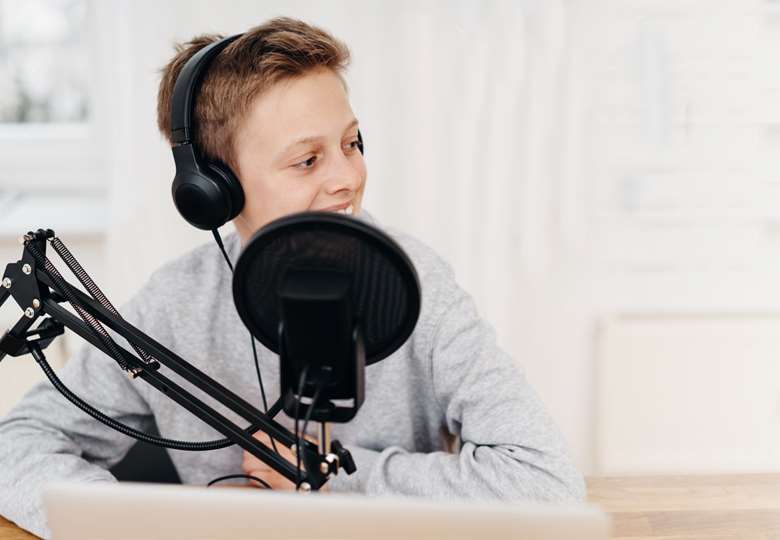Lend me your ears
Alex Thomas
Tuesday, September 1, 2020
Forced to think creatively about performance opportunities for secondary students during lockdown, Alex Thomas of Magdalen College School, Oxford set about making cross-curricular podcasts with his students

ADOBE STOCK/CONTRASTWERKSTATT
In late March, faced with five cancelled productions due to the imminent lockdown, we decided to try something new. The plan, swiftly hatched in a department meeting an hour before the school site closed, was to produce a radio play in weekly instalments during the summer term.
I had come up with a premise the previous evening, listening to the government's 5pm broadcast with my family. Gathered round the ‘wireless’, with foodstuffs disappearing from shops and freedom of movement curtailed, I was reminded powerfully of the opening months of World War Two, when a similarly indefinite period of waiting commenced in the form of the ‘Phoney War’. The next day Vera Lynn's We'll Meet Again popped up in the charts, so it was clear that I wasn't the only person struck by the parallels. It seemed a good starting point.
The rest of that final department meeting was spent sketching out a storyline, which flitted between 2020 and 1939. In brief: Beth, a 20-year-old student isolating in her mother's small house, stumbles across her Grandma Peggy's diary from the war years. As her own social life constricts, Beth starts living vicariously through Peggy, whose horizons broaden from the village shop to the WAAF, falling in love along the way and ultimately getting transferred to a secret RADAR base. The series ends with the Nazi invasion of the Low Countries in May 1940, just as Beth's 2020 world is beginning to emerge from lockdown.
We had very little time to plan the project but we learned a good deal as we went along; hopefully some of the following may prove useful to those looking for alternative drama projects while staging live productions remains problematic. It may also be of interest to those leading Unit 30 of the BTEC Performing Arts qualification, ‘Audio Performance’, particularly with reference to Learning Aims B and C, which are concerned with the more practical elements of audio projects.
The research
Having established a basic arc and an assortment of characters, our first priority was to begin researching life during the Phoney War. Eight sixth-form historians were each given a character to research; our school librarian assisted with identifying useful online material, not least from the school's own archives. As the historians sent through their findings we divided up each episode into scenes which were then handed out to a team of student script-writers. Each writer completed one scene per week, which was then edited to ensure historical accuracy and some integration of writing styles.
While all this was underway we were busy experimenting with online recording platforms and asking pupils to send in sample voice recordings. The actors and writers were encouraged to listen to successful radio plays in order to gain a better understanding of how voice actors work, and how a storyline is effectively sustained. Had time allowed, I'd have liked to devote more attention to this: Learning Aim A of the BTEC syllabus highlights useful areas for discussion (character, mood, atmosphere and setting) and suggests a nice range of listening materials, from Audible's literary dramatisations to The Archers.
The process
By the start of summer term we had episode 1 drafted and a cast list in place, so we were ready to record! Up until this point the process had been time-consuming but technically simple, using Microsoft Teams to share research and writing ideas. From here on in, the technology became vital.
We settled on Zencastr as our recording platform, which enables up to ten people at a time to record online dialogue simultaneously, though three or four is far more manageable. We began each session with equipment checks, trying to level out the variance between students’ home recording devices. Faulty internet connections became the bane of our lives, but we managed to run the sessions relatively efficiently, with a brief rehearsal followed by several takes of each scene as necessary.
Then it was over to the technical crew to piece together as many as fifty separate tracks per episode, before adding sound effects (often home-made, or downloaded from the BBC archive). Audacity and Audition software was used at this stage of the process, with each episode going through a fine-tuning process before being released via Soundcloud every Friday at 6pm.
It was painstaking work, but over forty pupils were involved as researchers, writers, actors, technicians and composers, and online rehearsals were often a lot of fun. Needless to say, many aspects would have been infinitely easier with everyone in the same room, and our ‘trial-and-error’ approach had its frustrations. But we were broadly very happy with the quality of the recordings and, above all, it kept a real sense of collaborative creativity alive during the lock down. I'd thoroughly recommend audio projects to anyone looking for a new way to keep pupils making theatre.
You can listen to Alex's students' work at https://www.mcsoxford.org/senior-school/drama/when-we-meet-again/

